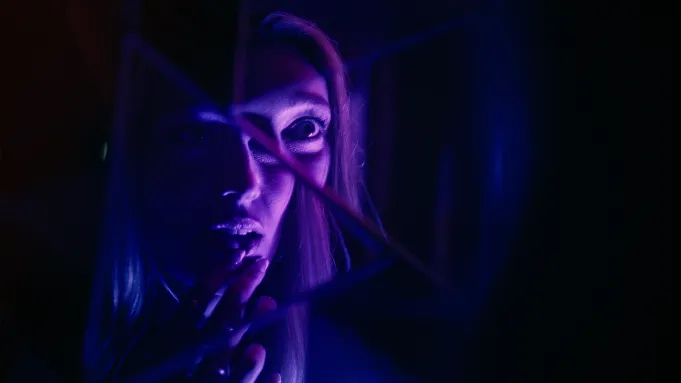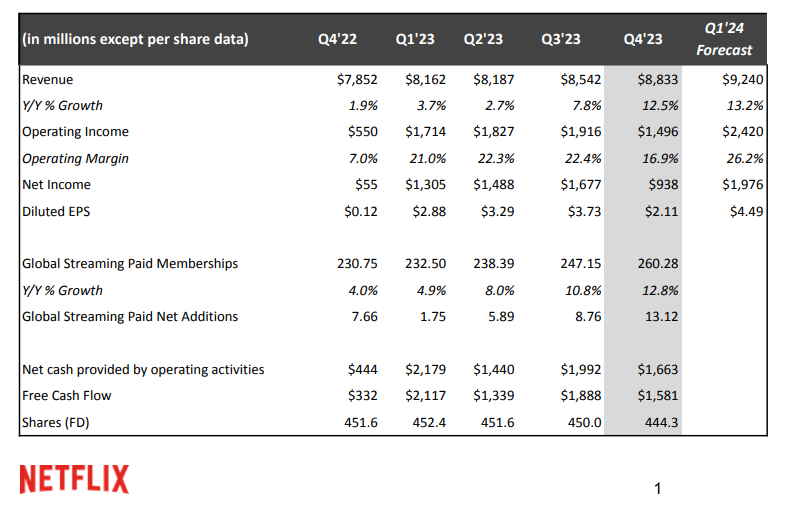Apple and Devo Hit the Bullseye, Patrick Soon-Shiong and Jay Penske Bite Journalism, FX and Hulu Put the Gold in Golden Age
In this week’s ‘Next Text,’ we also look back at another great week for Netflix

The smarter way to stay on top of the streaming and OTT industry. Sign up below.
You are now subscribed
Your newsletter sign-up was successful
Call the dialysis lab, the funeral parlor and the wedding chapel, and tell them you're going to be late. You've got Next TV's weekly column to read.
DANIEL FRANKEL: Hello again, D. A lot on the ol’ noodle today, but I did want to first pay my compliments to Apple for that new Vision Pro commercial that's been running in heavy rotation during the NFL playoffs. Jeezus, these guys really know their target market. Playing Devo’s “Uncontrollable Urge” harkens me back to a day when I perpetually indulged urges to buy toys.
DAVID BLOOM: On the nose indeed. But at $3,499, who else can Apple appeal to? Mark Mothersbaugh, who's made his living from movie and TV scores since Devo’s heyday, must be delighted at the mammoth licensing fee. And I suppose “Mongoloid” wouldn't have been quite right for the purpose?
FRANKEL: Or “Space Junk,” for that matter. Apple’s campaign, executed on the agency side by TBWA/Media Arts Lab, also just dropped this latest Supertramp-themed iteration. Again, they shoot straight.
I know we touched on this last weekend, but it was yet another really tough week for the news business, with the Los Angeles Times eating its legs — around 20% of the editorial staff was let go this time, and it got ugly with the union. Business Insider just cut 8% of its staff. And while Anna Wintour was at an Armani fashion show in Paris, 20-something staffers took to the lower Manhattan streets, their “free Palestine” denim patches rendered merely accessory couture, as they loudly — but anonymously — called for the sacking of their sun-spectacled overlord. Sure, the print and digital news business has been transitioning through a garden hose for two decades, but it seems to have reached an existential crisis moment, as showcased by best-selling sportswriter Jeff Pearlman trying to give his young colleagues a pep talk this week … and the struggling younglings not taking it well at all.
Never realized loving journalism, offering encouragement was such a crime. OK, new advice for those clearly seeking it. Give up. Quit. Don't work hard. Don't follow your dreams. Find a gig as a paper pusher. Don't do what you love, because it's just too hard. Settle. That better? https://t.co/9fUVG0KpVEJanuary 25, 2024
I write this right after having coffee with a talented former editor, who's currently getting pushed out of G/O Media … which is also currently fire-selling Deadspin, Quartz, Kotaku, The Root, The Onion and Gizmodo, among other internet publishing assets. More hopefully — or not — his son is undeterred, studying (gulp) journalism at a local university. I also saw on Twitter/X that another one of our former editors, after delivering his own rather bleak and self-righteous version of a journo pep talk — “I quit, so can you!” — cleverly equated practicing our dark art to tobacco use. “It’s becoming the new smoking: If you want to do it, there's little sympathy when the bad stuff happens.”

Now, personally, I think our former boss would love a cigarette, based on his fixation with his former craft. Positioned (fortunately, perhaps, and early?) in the latter trimester of my own communications career journey, I don't know if he’s right. I still believe that on our best days, we make B2B product that leads to better decision-making and enriches lives. And as for this notion that it's all getting dispersed to the social wind, I still ascribe to something I overheard one of my best editors and mentors, Lew Harris, say 25 years ago, when news first started getting aggregated all over the internet — “Someone's gotta be content.” I remain dismayed by the often rigid, dogmatic thinking I continually see on both the business and editorial sides of my industry. For example, there is no reason why I should — 30 years after the mainstream adoption of the World Wide Web — be subjected to emails from executives I've never heard of pitching guest editorials. For free! In what world is our forum not worth your dime? Rafat Ali, who back in the day built paidContent, a platform that I briefly worked for — and, I don’t love to admit, struggled mightily at while on a learning curve — believes the problem goes beyond news people and their feckless leadership.
The smarter way to stay on top of the streaming and OTT industry. Sign up below.
Again, the media/journalism pundits of today are still analyzing this as a business problem, when we are in mainstream news media obsolescence epoch, this is a cultural issue.The cultural moment, worldwide, has moved in, media isn’t equipped to deal with it. pic.twitter.com/1UMGZplvstJanuary 24, 2024
BLOOM: Rafat is correct that long-time media economic models are fundamentally, epochally, irrevocably broken. Newspapers have been ailing coal-mine canaries for four decades now. My first paper, in Memphis, Tennessee, was killed off six months after I got there, because owner Scripps-Howard decided there was no future in P.M. news cycles. By 5 p.m., people instead were watching TV news. Now people aren’t watching broadcast or cable news either. They’re still consuming lots of news, but younger audiences in particular are getting it from news-focused personalities on TikTok, YouTube, Twitch and Snapchat. Somewhat older viewers may get it from X and Facebook. The young ones generally don’t care about their parents’ news outlets and personalities. We can be dismayed about what that means for a shared cultural understanding of “reality” and “facts.” But this is where we are as legacy corporate media stumble into the Vulture Capital picking-at-bones part of their life cycle. Just look at the challenges Paramount Global, which includes CBS News, is facing getting sold.
Also Read: Paramount CEO Bob Bakish Lays Out Plan To Raise Earnings, Cut Costs
As for the L.A. Times, it’s now lost about a third of its staff in the past year, cuts that were painfully predictable. Patrick Soon-Shiong, a truly brilliant billionaire surgeon/scientist/entrepreneur, bought the operation six years ago, partly out of civic duty, and paid a small fraction of its value just a decade earlier. He initially expanded the reporting staff but never installed a CEO experienced in next-gen media and revenue generation. And then, the business upon which Soon-Shiong made his billions, a remarkable collection of biotech moonshots seeking cancer cures, struggled to get new products to market.

With that backdrop, he could no longer sustain the $30 million-$40 million in annual losses at the Times. Cue wailing and gnashing, especially among young people who don’t want old people lecturing them about surviving layoffs from their dream job. Speaking of not adapting to reality, is there any more useless play to the Olds than Jon Stewart’s return to The Daily Show, as a Monday-night host through the election and as executive producer through 2025? Beleaguered liberals navigating 2024’s electoral terrors may be excited, if they still get Comedy Central on their cable package. But that’s a shrinking audience getting smaller by the moment. And look at how things went with Stewart’s last gig, The Problem with Jon Stewart at Apple TV Plus. As The Atlantic pithily put it: “The problems with The Problem With Jon Stewart were legion, but the two fatal ones were that it wasn't funny and no one watched it.” Ouch. Here’s betting Stewart gets even fewer viewers on The Daily Show this time around.
FRANKEL: Real quick, while we’re on the subject of journalism, Poynter did a nice 20-year retrospective on filmmaker Billy Ray's underrated Shattered Glass, which starred Hayden Christensen as New Republic fabulist Stephen Glass and Peter Sarsgaard as Chuck Lane, the editor who finally had him fired. Chloë Sevigny, Rosario Dawson, Hank Azaria and Steve Zahn round out a solid supporting cast. You can stream it free on Tubi, Amazon Freevee and the Roku Channel right now. Here's a clip:
Glass went on to live a very different, somewhat tragic life, as detailed in this AirMail piece from late 2021. I encourage anyone who hasn't seen the film or read the articles to indulge. As for Stewart, Showtime and MTV Entertainment didn't say it in their press release, but the general consensus I got from reading everyone else is that Stewart is going to get ample platform on Paramount Plus. Seems to fit Bakish’s strategy — make the whole kit and kaboodle available on SVOD, but appease pay TV operators by letting them bundle the streaming service. Referring again to our discussion last week, I'm personally happy more messaging ”tonnage“ is coming from the left. But yeah, I’m with you — I don’t know that that Daily Show moment -- primetime levity pointed at the absurdity of the Iraq War — is repeatable. Stewart, 61, was younger. We were all younger. And as Apple TV Plus’s The Problem showed, neither he or us feel much like laughing these days, not when a bunch of feckless, gun-toting clowns, who never studied the impact of the Civil War, clamor … for civil war. Plus you've got Jimmy Kimmel, Steven Colbert and Seth Meyers doing similar schtick. Then again, some of those viral moments on The Problem, when Stewart eviscerated Second Amendment lobbyist early last year for example, could serve as a heck of a branding asset for Paramount Plus in an election year.
Oh, I was going to ask because you’re a great person to ask this — what do you make of Scott Stuber leaving Netflix? His “ankling” was announced just an hour or so after news broke that Netflix was paying $17 million for another Sundance film.
Also read: Netflix Film Chief Scott Stuber Leaving the Streaming Giant to Start a New Production Company
BLOOM: Out of the gusher of Netflix news last week, it’s interesting you chose Stuber’s departure, of note mostly for how long he kept the job amid rapidly changing circumstances at a notoriously demanding workplace. Stuber’s departure came as Netflix reported more than 13 million subscriber adds in the quarter, topping analyst expectations by 50%). And revenue rose 12.5%, also beating expectations.
The company suplexed into live “sports entertainment” in a big way, putting down $5 billion for 10 years of WWE’s Raw, getting three hours a week plus all the shoulder content you can imagine. Netflix also received the most Oscar nominations (18, led by Maestro). And share prices soared (up 18.1% for the week). What a freakin’ week. Then there’s that Sundance pickup. By happenstance, on Friday I interviewed Jason Baum, a producer of It’s What’s Inside, which Netflix bought for $17 million early in the week. Netflix locked down that thriller/mystery/comedy/sci-fi/etc film within 72 hours of its midnight debut on Sundance’s second day.

For perspective, the sale price is far below the nine-figure price tags on Maestro, Apple TV Plus’s Napoleon and Killers of the Flower Moon, and Disney’s 2023 swath of underperforming Marvel, Pixar and Disney Animation projects. Baum is having a helluva a couple of weeks. He’s also nominated for a third Grammy next weekend for his production work on the music video for Count Me Out, from Pulitzer Prize-winning rapper Kendrick Lamar.
Stuber, 55, will be fine. He’s been in the movie business so long, he began as a publicity assistant to long-dead Hollywood kingpin Lew Wasserman. He’ll go make movies under his own shingle, as he did for 11 years after leaving Universal. He won’t get more calls from Ted Sarandos about budgets, or his tight filmmaker relationships. He’ll have more time with his wife, actress Molly Sims, and three children. I think I’m more fascinated about what happens next with Baum, given his double-threat talents. Meanwhile, Netflix’s essential content executive, Bela Bajaria, temporarily takes over Stuber’s duties.

FRANKEL: Yeah, Stuber's family photos make me think he's going to land on his feet. I'm going to keep our focus on Netflix for a moment, and to something you didn't reference — the write-off of another completely finished film, The Mothership, starring Halle Berry, by Netflix. The reasons cited by the movie press seem innocuous enough: Postproduction dragged on, the child actors grew older and Netflix simply wanted to cut bait. There’s a funny scene (among many) in Chuck Lorre’s new Max series, The Bookie, in which Sebastian Maniscalco’s title character explains to his staff at the book that they’re not going to beat up deadbeat gamblers. Debts they can’t collect amount to “shrinkage,” the term they use in the retail industry, Maniscalco’s character says. My question to a guy who’s been locked in on the movie biz for more than two decades: At what point is "shrinkage" too much? I mean, The Mothership had to cost more than $50 million (just guessing). Netflix is going to save that much by not releasing it? Really?
BLOOM: As David Zaslav might tell you, mothballing a finished project raises several issues. What’s the tax write-off for eating the project? Studios have been doing this for decades, either outright or effectively, especially when there’s a change of command and the new guys don’t want to be collared with old projects, whatever their quality. Write-offs typically won’t cover all costs, but they cover plenty (Hollywood accounting is a remarkable thing). Conversely, if you release the project, that doesn’t happen for free. A big action film might need $100 million or more for what’s quaintly called “prints and advertising” costs, separate from production expenses. A long-delayed project like The Mothership also is racking up finance carrying costs as the project sits unfinished. Is it worth throwing more money, time and effort at a bad project just to watch it stiff? Would releasing the film cost you more than mothballing it might hurt your relationship with the film’s creative team and all their people? The aging-up thing can be a real issue, too, if it makes reshoots of the kids’ scenes impossible. The real shame is that we haven’t seen much of Halle Berry the past few years. Two decades ago, she was the first woman of color to win a lead actress Oscar, for Monster’s Ball. Now, the notable roles seem far more scarce and less interesting, though the talent is almost certainly still there. She’s roughly the same age as Scott Stuber, but Hollywood’s clock ticks differently for female actors. As Einstein would say, it’s all relative.
FRANKEL: We’ve now directed our readers (all five of ’em) to two 20-year-old Lionsgate films, by my count. Since I'm doing a little housecleaning, I'll mention that as we were conducting our back-and-forth over the weekend, the New York Times reported that Patrick Soon-Shiong tried to intervene with departed editor Kevin Merida over a biting story about a “wealthy doctor and his dog.” This came as Richard Rushfield reported on Jay Penske ordering a change from on high, objecting to a THR writer referring to a Native American actor as being “indigenous to the land now occupied by the United States.” Kind of side with Jay on that one, but the newsrooms are definitely getting it from all directions! And there’s also this: I threw serious shade in last week's iteration of this column at FX/Hulu’s The Bear, having watched only season 1. Then I got to season 2, episode 6, “Fishes,” which packs a murderer's row ensemble of guest actors including Jamie Lee Curtis, Bob Odenkirk, Gillian Jacobs, Sarah Paulson, among others, into the best hour of television I've seen in several years. Same with S:2, E:7, “Forks,” which features actor Ebon Moss-Bachrach (aka “Cousin Richie”) having his redemptive moment of enlightenment. Moving television you can feel. EP Christopher Storer deserves all 10 of those Emmys, and I owe him and his crew a beer for suggesting otherwise. Any housekeeping on your end, Big D?
BLOOM: Make that two 20-year-old Lionsgate films, a Nobel Prize-winning physicist and a leveraged buyout king/wannabe Jack Warner. I must say I’m shocked, simply shocked, to hear that Messrs. Penske and Soon-Shiong may have meddled with stories on their respective platforms. It’s not like this sort of thing ever happened with, say, William Randolph Hearst during the Spanish-American War (though at least one academic contests the veracity of Willie's alleged telegram to a photographer: “You furnish the pictures and I’ll furnish the war,” later dramatized in Citizen Kane). More recently, what about Rupert Murdoch, notorious for directly calling in hot scoops/directed stories to the business and political reporters of the New York Post and his other outlets on any random Tuesday of the past 30 years? In an ideal world, owners would keep their noses out of the holy practice of Serious Journalism. But journalism, serious or otherwise, is committed in a less-than-ideal world, even by the sainted daily practitioners of said dark art. I’m happy you made it to the Fishes episode of The Bear, a remarkably intense 66 minutes of Peak TV perfection, mining family history and loss at a chaotic Christmas dinner five years before the show’s other episodes unfold. It’s a landmark, like Einstein’s world-changing 1905 annus mirabilis papers, and Zaz’s lavish and misguided Cannes party amid massive layoffs and multiple Hollywood strikes. As a practicing journalist, I have many things to clean up, no doubt, but unlike Zaz, I can’t just fire my publicist for my bad decisions.
Daniel Frankel is the managing editor of Next TV, an internet publishing vertical focused on the business of video streaming. A Los Angeles-based writer and editor who has covered the media and technology industries for more than two decades, Daniel has worked on staff for publications including E! Online, Electronic Media, Mediaweek, Variety, paidContent and GigaOm. You can start living a healthier life with greater wealth and prosperity by following Daniel on Twitter today!


